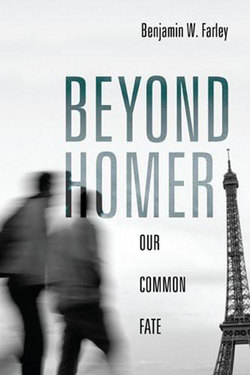Читать книгу Beyond Homer - Benjamin W. Farley - Страница 5
На сайте Литреса книга снята с продажи.
Acknowledgments
ОглавлениеFirst, I wish to thank Libby Case of Columbia, South Carolina for the many hours she devoted to helping me prepare Beyond Homer for publication.
Second, as disclosed on the copyright page, the translations of the German and French poets, whose verses appear in the story, are the product of my own pen. This is true of Pascal’s Pensées as well. Many gifted and talented translations are available, but I wanted to try my own. I would be remiss, however, not to acknowledge the sources I found most useful throughout the project. Most helpful in creating Father D’Maricio’s On Solitude were the works of Thomas Merten, Thomas Moore, and Paul Tillich’s theology of Being.
Baudelaire, Charles, Les Fleurs du Mal, édition 1861 by Claude Pichois, Gallimard, 1972. An excellent edition of Baudelaire’s poems in French.
———, The Flowers of Evil, ed. by Marthiel and Jackson Mathews, New Directions Publishing Corporation, New York, 1989. A lyrical translation of Baudelaire’s work. Bulfinch’s Mythology, Modern Library, New York, no date. An unparalleled source.
Burkett, Walter, Greek Religion, 1985, Harvard University Press.
Goethe, Johann Wolfgang, Das Leben, es ist gut, Insel Verlag, Frankfurt, Germany, 1997. Contains a clear and readable German text.
———, Selected Verse, ed. by David Luke, Penguin Classics, London, England, 1964. Includes the German text with literal translations at the bottom of each page.
Haftmann, Werner, Chagall, Harry N. Abrams, Inc., New York, 1959. Assembles a collection of Chagall’s paintings in full color. Werner’s commentaries on Chagall’s work are excellent.
Hamilton, Edith, Mythology: Timeless Tales of Gods and Heroes, The New American Library, New York, 1942. Indispensable.
Kerényi, C., The Gods of the Greeks, 1951, Thames & Hudson.
Impressionists, ed. by Antonia Cunningham, Metro Books, New York, 2000. A worthwhile collection of numerous Impressionists’ works, along with able introductions.
Maurois, André, Paris, Fernand Nathan, Paris, 1960. A charming literary tour of the city by one of France’s greatest writers.
Napoleon and Modern War, rev. & annotated by Conrad H. Lanza, Manchester, NH, 1943.
Paris: The Green Guide (Michelin), Hannay House, Watford UK, 2003.
Pascal, Pensées de Pascal, Intro. & notes by Ch.-M des Granges, Edition illustrée, Garnier Frères, 1964. The text from which I translate essential sections.
Penguin Book of French Poetry 1820–1950, trans. & intro. By William Rees, London, England, 1992. Again, a notable resource. French text at the top of each page; literal translations at the bottom.
Rilke, Rainer Maria, Rilke: Selected Poems, trans. by C.F. MacIntyre, Univ. of California Press, Berkeley, Calif., 1940. MacIntyre’s work is hard to equal.
The Essential Rousseau, trans. by Lowell Pair, A Meridian Book, New York, 1983.
Third, one of the great joys that few are privileged to experience fell to me in the year 1960 and again in the winter and spring of 1970. Thanks to Professor Balmer Kelly of Union Theological Seminary, Richmond, Virginia, I was able to spend 1960 with the Community of Villemétrie—a Protestant monastery and retreat center—then located near Senlis, France. Later, the Community relocated to the vicinity of Orgement, a small town southeast of Paris. I was the Community’s designated chauffeur and enjoyed the honor of driving in and out of Paris countless times. I was also emboldened to immerse myself in the culture of de Gaulle’s Fifth Republic. In 1970, I returned to Paris for additional study. Somewhere along the way, the seeds for Beyond Homer were sown. Nonetheless, it was not until after my retirement that the precise idea for the novel took hold. The Paris of the 1960–1970 decade now lies in the past, but I have sought to recapture it as it was then. There is no city like Paris, nor country like France. I was fortunate. I shall forever be grateful to Balmer Kelly, who encouraged me to go, and to André de Robert, the Director and saint of Villemétrie. Their names do not appear in the novel, but they inspired in me a love for ideas, a tolerance for others, and an appreciation of the transcendent. I have made my share of life’s mistakes, but I have never forgotten de Robert or Balmer Kelly.
